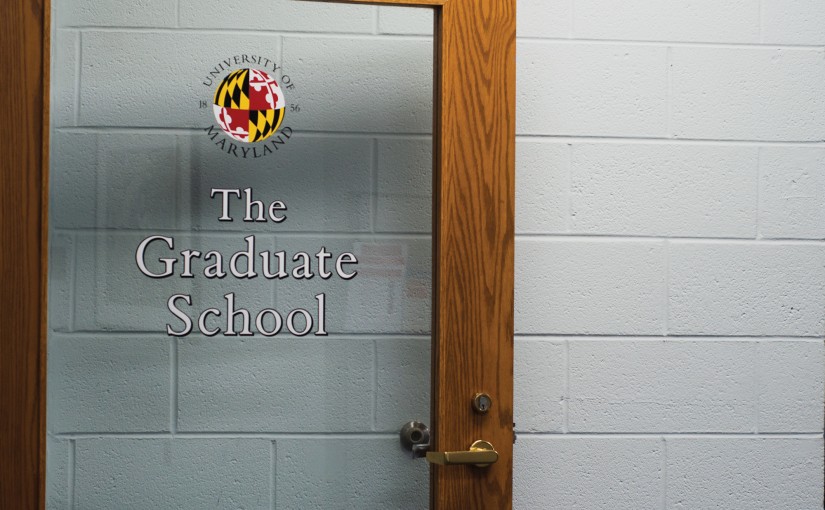Most of the time when graduate students come to his office, University of Maryland Ombudsman Mark Shayman can’t point them to a procedure that spells out how to resolve the issues they face.
While there are grievance procedures for graduate students who have complaints about test grades and for those who feel their assistantship was wrongfully terminated, there isn’t one in place for students who feel bullied, disrespected or abused by their advisers, he said.
“Sometimes faculty members do things and really there should be a response from the university, and there’s not really a place for students to go where they feel they can be heard officially,” Shayman said. “There’s something missing.”
In spring 2017, the graduate school convened a committee of faculty, staff and graduate students to review the existing grievance policy and make recommendations for filling in its gaps. The committee summarized its findings in a report, which it submitted to the graduate school in November.
[Read more: “People are really struggling”: grad student survey shows widespread financial insecurity]
The report pulled examples of issues not covered by existing policy from the experiences of students on the committee and from a 2016 Graduate Assistant Advisory Committee survey. There were nearly 4,000 graduate research and teaching assistants at this university in fall 2016, according to the Office of Institutional Research, Planning and Assessment. Of the more than 1,000 graduate assistants to complete the survey, more than half listed grievances in response to open-ended questions.
Such grievances included faculty members intimidating graduate students through hostile language, requiring students to perform labor without compensation and arbitrarily awarding funding and research opportunities, the report read.
The graduate school currently has no ability to sanction faculty members for abusive behavior beyond discrimination or sexual harassment, graduate school spokesperson Mary Carroll-Mason wrote in an email. She noted that one of the motivations for forming the committee was that the ombudsman indicated “his hands are often tied by a lack of policies against abusive behavior that doesn’t fall under the university’s existing policies.”
The committee report states that of the 65 grievance complaints Shayman reported for the 2016-17 academic year, 23 percent of the cases were about a research adviser. Shayman said in most of these cases, graduate students do not want him to contact their advisers because they fear retaliation.
“It’s not a symmetric relationship,” Shayman said. “One side has the power and the other doesn’t.”
Communication doctoral student Morgan Hess, the sole instructor for her COMM107 section, said she has little interaction with her supervisor. That’s the same supervisor who, like most supervisors for teaching assistants, will sit on the committee that examines her dissertation and has the power to approve her teaching schedule, write her letters of recommendation and nominate her for awards and fellowships.
“Every time you want to raise a justifiable complaint, you have to consider if that complaint is worth your academics or your schedule or your standing in the department,” she said. “It becomes easier to just put up with it because there’s no clear way to resolve it and you don’t want to worry about making things worse for yourself by raising concerns.”
Hess is a teaching assistant, so she is funded by her department. But when faculty members are awarded research grants from sources outside this university, the money supports the hiring of research assistants. Shayman said these students are not only beholden to their adviser for academic support, but also for financial support.
[Read more: Graduate assistants will receive a 2 percent stipend increase next year]
Leila Duman, a graduate research assistant in the chemistry department, said she is fortunate enough to have a relationship with her adviser that is one of mutual respect.
“I don’t know of any graduate student who wants to make waves with their adviser,” she noted. “It’s not going to end well for the grad student if they do that.”
International students are in an even more precarious position because if they lose their assistantships, they not only lose their financial support but could also potentially lose their residency in the country, Shayman said.
To maintain student status, international students must “pursue a full course of study and make normal progress towards the completion of the program of study,” according to the International Student and Scholar Services office’s website.
“For international students, you have to listen to the person who is abusing you with no complaining,” said graduate research assistant Shivang Patel, who is an international student from India, adding he feels secure in his relationship with his adviser.
In May, the Graduate Council will vote on a proposal to submit a request to the University Senate that would require each school and college to create an internal grievance policy. The proposal would also add a rights and responsibilities section to the Graduate Catalog that would explicitly state that graduate students have the right to work in an environment that must be “free of intimidation, fear, coercion, reprisal, harassment and bullying or other unacceptable behaviors.”
“If this thing passes, there would be a formal procedure to address these issues and there would be consequences for the abusers,” said Roozbeh Bakhshi, a graduate student who served on the grievance committee. “It’s a big change, it’s a big deal.”



